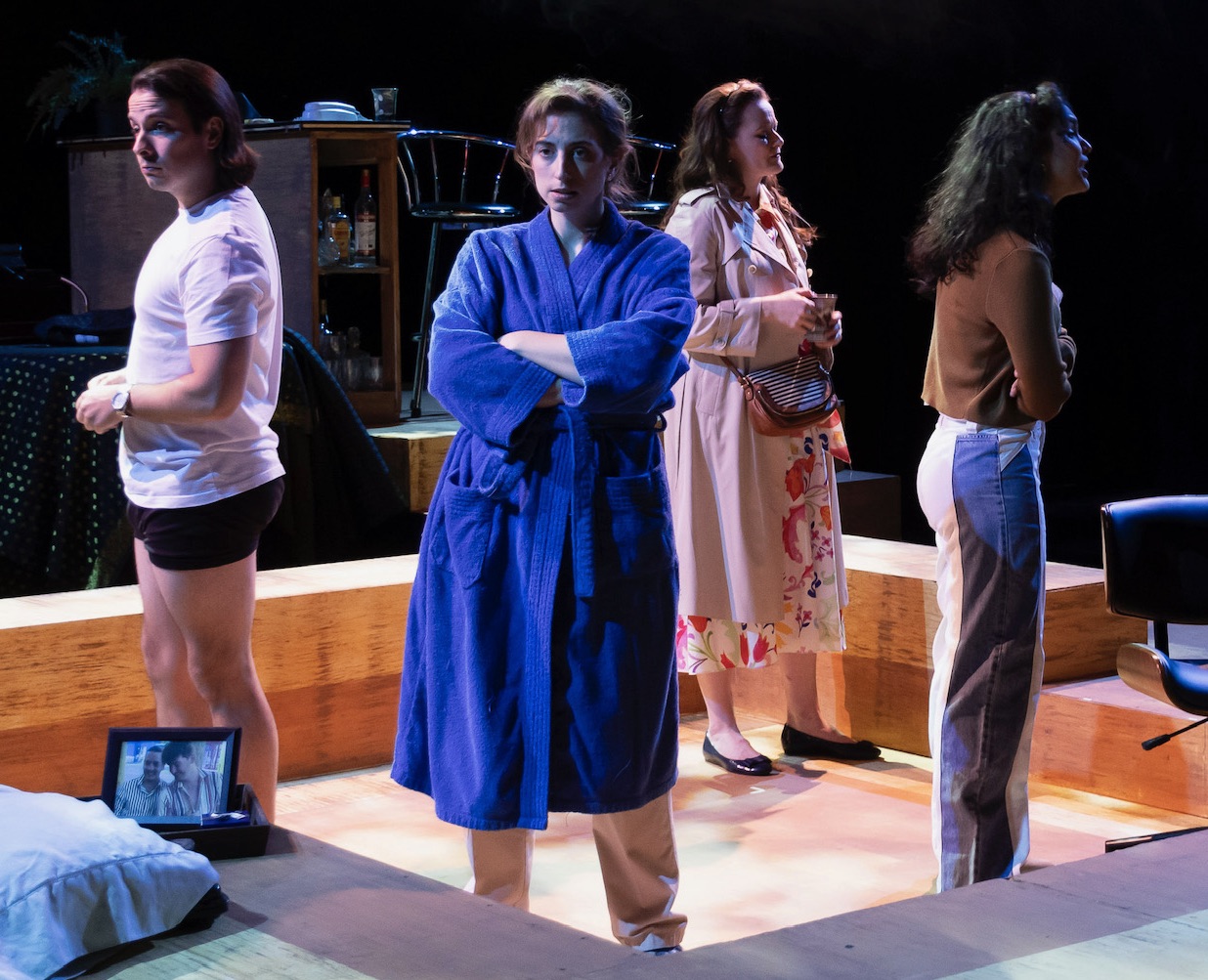I enjoyed myself at When We Were Singing. Beyond that, the analysis gets more complicated.
Off the top, I want to thank the company for accommodating my schedule and letting me see this show in its first and only preview. To be clear, this cast had never performed in front of an audience before and that’s a big deal. But everybody seemed confident, which is great.
In this sung-through musical by Dorothy Dittrich, four thirtyish friends struggle to solidify their adult identities: their relationships and careers. True to that time of life, they are relentlessly self-absorbed, which is a lot clearer and funnier to me now than it was when I saw this show in my relative youth in 1995. “I believe that talent’s not the problem,” one of them sings with bravado. “You don’t have to be smart to be rich.” They are trying to deserve the lives they want and justify the lives they have.
There are four characters: Abby, a struggling actress who tries to lie to cover up her romantic failures; Jenny, a screenwriter who does a lot of therapy and, inexplicably, falls in love with Abby anyway; Les, an actor/waiter, who is still mourning the lover he lost to AIDS (1995, remember); and Belinda, who has a straight job, money, and a simmering problem with alcohol.
The Jenny/Abby entanglement provides a slight narrative backbone but When We Were Singing is essentially a song cycle about friendship and growing up. In their verbal wit and musical sophistication, Dittrich’s songs remind me of Sondheim — and that’s not a diss about being derivative, that’s a compliment about complexity. Complaining about Abby, Belinda sings, “I’ll tell you what kind of friends we are/At my own funeral, she’d be the star.” And Jenny worries about becoming “what I fear the most, a rejected little lesbian buying land up the coast.” But there’s an undertow of melancholy, as when Les sings about being unable to recover the golden ease of the time “when we were all singing.”
Dittrich’s songs are often sumptuous, but they are not easily hummable showtunes. The vocal lines in her score are challenging and, under Christopher King’s musical direction, this cast does a consistently impressive job of negotiating them.
That’s not to say the vocal performances are all equally successful. Nevada Banks, who’s playing Abby, often lacks the power to make herself heard. Viviana Renteria (Belinda) is hard to understand at times and her vocal tone is harsh.
Fortunately, the other two performers are much more successful. Michael Briganti’s embodiment of Les is appealingly casual: his relaxation allows for both a rich vocal tone and subtle characterization. And Rachel Kent is terrific as Jenny: her strong voice is full of texture, she’s emotionally responsive and transparent, and she catches every note of the comedy.
Narratively, When We Were Singing doesn’t always feel fully realized. There’s the unlikelihood of the Jenny/Abby fling, and Belinda’s booziness is introduced then forgotten.
But, for me, these concerns mostly got lost in the flow of Dittrich’s music, the luxurious sense of being washed over by wave after warm sonic wave. In this production, onstage pianist Gordon Roberts does a masterful job of fostering that feeling. And, working with Laura Di Cicco, director Roy Surette sculpts an endless series of pleasing tableaux with the actors. Call me crazy but, for me, the horizontal planes of Brian Ball’s wooden set echo the planes of the music. Brad Treneman’s lighting is unusually attentive. And the costumes by Sydney Cavanagh and Rosie Aiken are subtly rewarding in their patterns and textures.
This production isn’t perfect, but I’m grateful for its gifts.
WHEN WE WERE SINGING by Dorothy Dittrich. Directed by Roy Surette with Laura DiCicco. On Thursday, May 30. A United Players production in association with Touchstone Theatre. Running at the Jericho Arts Centre until June 23. Tickets and information
PHOTO CREDIT: Michael Briganti, Rachel Kent, Nevada Banks, and Viviana Renteria (Photo by Nancy Caldwell)






0 Comments